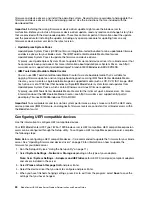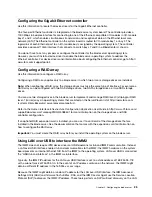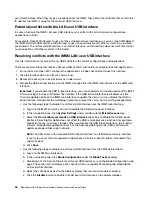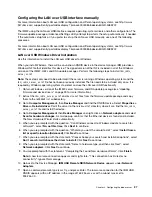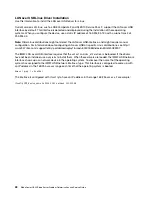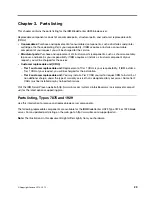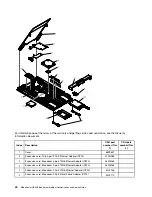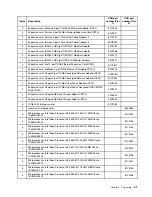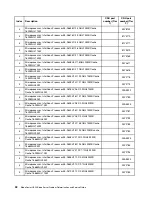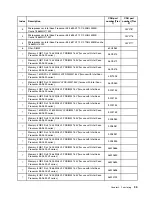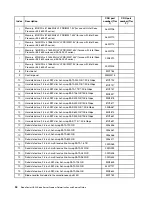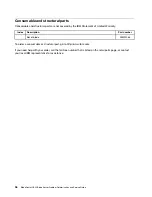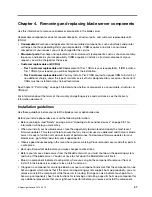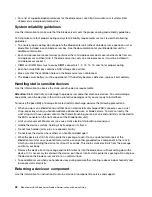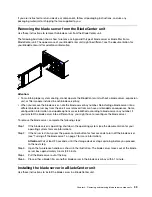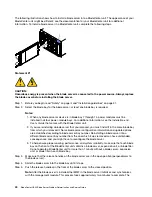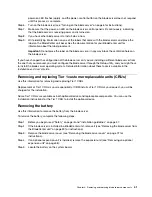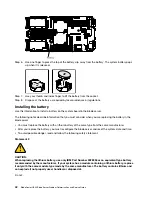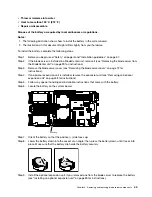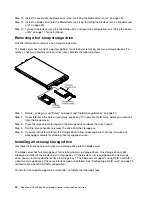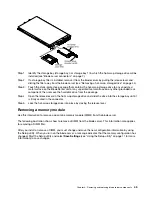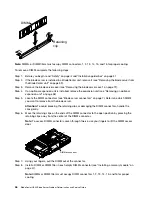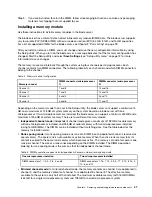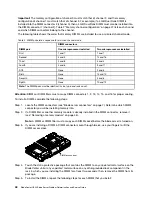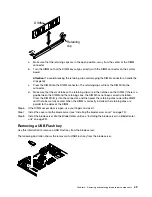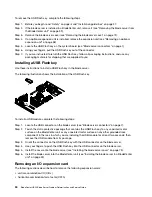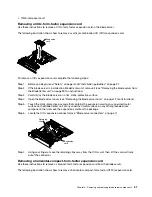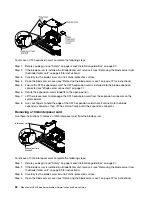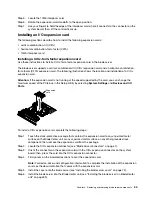
• For a list of supported optional devices for the blade server, see http://www.ibm.com /systems/info/
x86servers/ serverproven/compat/us/.
System reliability guidelines
Use this information to make sure that the blade server meets the proper cooling and reliability guidelines.
To help make sure that proper cooling and system reliability requirements are met, review the following
guidelines:
• To ensure proper cooling, do not operate the BladeCenter unit without a blade server, expansion unit, or
blade filler installed in each blade-server bay. See the documentation for your BladeCenter unit for
additional information.
• Each microprocessor socket always contains either a microprocessor dust cover and heat sink filler or a
microprocessor and heat sink. If the blade server has only one microprocessor, it must be installed in
microprocessor socket 1.
• DIMMs or DIMM fillers must occupy DIMM connectors 1, 2, 13, 14, 15, and 16 for proper cooling.
• Each hot-swap SAS bay contains a SAS storage drive or filler.
• Make sure that the ventilation holes on the blade server are not blocked.
• The blade server battery must be operational. If the battery becomes defective, replace it immediately.
Handling static-sensitive devices
Use this information to observe the static-sensitive device requirements.
Attention:
Static electricity can damage the blade server and other electronic devices. To avoid damage,
keep static-sensitive devices in their static-protective packages until you are ready to install them.
To reduce the possibility of damage from electrostatic discharge, observe the following precautions:
• When you work on a BladeCenter unit that has an electrostatic discharge (ESD) connector, use a wrist
strap, especially when you handle modules, optional devices, or blade servers. To work correctly, the
wrist strap must have a good contact at both ends (touching your skin at one end and firmly connected to
the ESD connector on the front or back of the BladeCenter unit).
• Limit your movement. Movement can cause static electricity to build up around you.
• Handle the device carefully, holding it by its edges or its frame.
• Do not touch solder joints, pins, or exposed circuitry.
• Do not leave the device where others can handle and damage it.
• While the device is still in its static-protective package, touch it to an
unpainted
metal part of the
BladeCenter unit or any
unpainted
metal surface on any other grounded rack component in the rack in
which you are installing the device for at least 2 seconds. This drains static electricity from the package
and from your body.
• Remove the device from its package and install it directly into the blade server without setting down the
device. If it is necessary to set down the device, put it back into its static-protective package. Do not place
the device on the blade server cover or on a metal surface.
• Take additional care when you handle devices during cold weather. Heating reduces indoor humidity and
increases static electricity.
Returning a device or component
Use this information for instructions to return a device or component to service and support.
38
BladeCenter HS23 Blade ServerProblem Determination and Service Guide
Summary of Contents for BladeCenter HS23 1929
Page 1: ...BladeCenter HS23 Blade Server Problem Determination and Service Guide Machine Types 7875 1929 ...
Page 284: ...268 BladeCenter HS23 Blade ServerProblem Determination and Service Guide ...
Page 289: ...Taiwan BSMI RoHS declaration Appendix B Notices 273 ...
Page 290: ...274 BladeCenter HS23 Blade ServerProblem Determination and Service Guide ...
Page 296: ...280 BladeCenter HS23 Blade ServerProblem Determination and Service Guide ...
Page 297: ......
Page 298: ...Part Number 00KC215 Printed in China 1P P N 00KC215 ...
Page 299: ... 1P00KC215 ...

